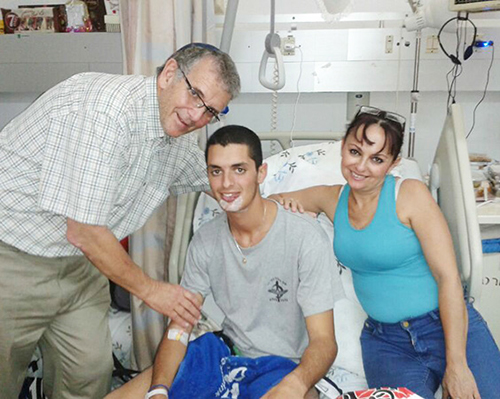
Last week, Pini Rabinovitz attended a memorial service for a soldier who was killed in the second Lebanon war, visited victims of terror being treated at Soroka Hospital, provided financial assistance to families in Sderot, and checked in on several individuals suffering from recurring PTSD, a condition that has been exacerbated by the war in Gaza. For Rabinovitz, a core staff member at OneFamily, Israel’s leading national organization solely dedicated to the rehabilitation of victims of terror attacks and their families, it was just a typical day on the job.
While OneFamily provided extra support during Operation Protective Edge, every member of the organization is as busy as Rabinovitz every day of the year.
“We assist victims of terror through emotional support, retreats, support groups, and therapeutic workshops for bereaved parents, parents of injured children, bereaved or injured young adults, soldiers, widows and widowers, orphans, bereaved siblings, and wounded victims of all ages. And those are just the most basic services we provide. Our work keeps us busy around the clock,” explains Rabinovitz.
“Terror never sleeps and its aftershocks never truly fade away, so we must remain vigilant. That means being ‘on-call’ for victims of terror across the country and constantly finding new ways to support them and show them that we care.”
Like most OneFamily staffers, Rabinovitz wears many hats. He is a sounding board, a therapist, a confidant, and a legal advisor. He describes himself as a “Swiss Army Knife” for victims of terror in need.
At the height of the second Intifada, Rabinovitz found that he provided an invaluable service to the families of victims of terror by listening to them and making important connections where he could. Soon thereafter, he left his job as a sales agent for Rubbermaid and started working for OneFamily. “I decided to leave my job of 27 years and do work that would feed my soul. I have never looked back.”
In his role as Regional Coordinator of the South, Rabinovitz spends a lot of time in his car driving from his home in Efrat to Beersheva, Ashkelon, Sderot, Nitzan, and Ashdod. “I often joke that I work 26 hours a day, and at times it feels like it is true. I am either on the phone with families, making house calls, or facilitating a therapy group, but I am always moving.”
Rabinovitz moderates the long-term localized support groups in the South for victims groups that meet weekly and monthly. The workshops and groups help the victims work through self-esteem issues, adjust to socio-economic pressures, learn various techniques to cope effectively with crisis or stress, and provide a platform for general growth and development in a safe environment. Though Rabinovitz does not conduct the meetings himself, his presence and reliability is calming. He is a familiar face that the families know they can count on week in and week out.
“Immediately following a terror attack, the nation comes and visits the families; there is an outpouring of support. But then people have to get on with their lives, and the victims and their families fade into the background,” says Rabinovitz. “But we can never forget. We are their permanent family, providing the support they need for years after their names disappear from the headlines. Helping victims of terror is about more than just counseling, it’s about helping these individuals regain their ability to live day to day.”
For the family of a victim of terror, that could translate into financial aid or having someone pick up the medication they need on a regular basis. It could also mean attending a memorial service to honor the memory of someone who was killed years ago, or relieving a father who has been watching over his son at the hospital.
“Terrorism has changed the lives of thousands of Israelis forever. We do whatever we can to make sure that they don’t bear these burdens alone.”
Despite the long, emotionally draining days, Rabinovitz can’t stop moving. There are too many people in need and only a finite number of hours in the day to help ease their pain. Then again, time and space are no match for this man on a mission.
By Ayala Young










